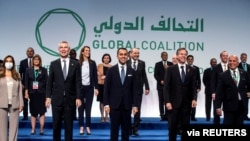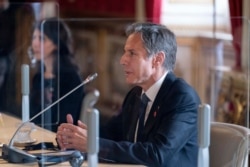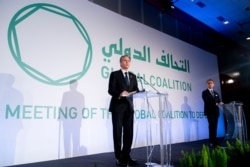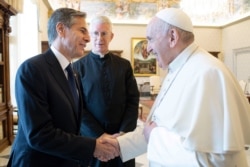A global coalition to fight Islamic State terrorists said Monday that 8 million people have been freed from their control in Iraq and Syria, but the threat from ISIS fighters remains there and in Africa.
Coalition ministers met face-to-face in Rome for the first time in two years, pledging to maintain watch against a resurgence of the insurgents.
The resumption in ISIS “activities and its ability to rebuild its networks and capabilities to target security forces and civilians in areas in Iraq and Syria where the coalition is not active, requires strong vigilance and coordinated action,” the diplomats said in a concluding communique.
The coalition said it needed “both to address the drivers that make communities vulnerable to recruitment by Daesh/ISIS and related violent ideological groups, as well as to provide support to liberated areas to safeguard our collective security interests.”
The group “noted with grave concern that Daesh/ISIS affiliates and networks in sub-Saharan Africa threaten security and stability, namely in the Sahel Region and in East Africa/Mozambique.” The coalition said it would work with any country that requested help in fighting ISIS.
Daesh is Arabic acronym for Islamic State.
U.S. Secretary of State Antony Blinken said at the start of the coalition meeting, “We’ve made great progress because we’ve been working together, so we hope you’ll keep an eye on the fight, keep up the fight against this terrorist organization until it is decisively defeated.”
He said coalition efforts had produced “significant achievements,” including virtually ceasing the movement of foreign fighters into Iraq and Syria.
Blinken noted that 10,000 ISIS militants are being detained by Syrian Democratic Forces, calling the situation “simply untenable” and calling on governments to repatriate their citizens for rehabilitation or prosecution.
The top U.S. diplomat announced $436 million in additional humanitarian aid for Syrians and communities in surrounding countries that have been hosting Syrian refugees. He said the money would go toward providing food, water, shelter, health care, education and protection.
The United States launched a coalition effort, now involving 83 members, aimed at defeating the Islamic State group in 2014 after the militants seized control of a large area across northern Syria and Iraq, and in 2019 declared the militants had been ousted from their last remaining territory.
Another meeting Monday in Italy focused specifically on Syria, where in addition to issues related to the Islamic State group, Blinken, Italian Foreign Minister Luigi De Maio and other ministers called for renewed efforts to bring an end to the decade-long conflict that began in 2011.
Humanitarian access, in particular the ability for the United Nations to deliver cross-border aid, were among the issues that Blinken highlighted, the State Department said.
He also expressed U.S. support for an immediate cease-fire in Syria.
“Stability in Syria, and the greater region, can only be achieved through a political process that represents the will of all Syrians,” Joey Hood, the acting assistant secretary for the Bureau of Near Eastern Affairs, told reporters. “We’re committed to working with allies, partners, and the U.N. to ensure that a durable political solution remains within reach.”
Efforts to resolve the Syrian conflict, through a combination of halting the fighting and carrying out a political roadmap endorsed by the U.N. Security Council, have seen little progress in recent years.
Hood said the international community “must renew its shared resolve to ensure the protection, dignity, and human rights of the Syrian people.”
Earlier Monday, Blinken visited the Vatican to meet with Pope Francis and other officials, with climate change, human rights and human trafficking among the topics of discussion.
The visit came ahead of an expected October meeting between the pope and Joe Biden, the second Catholic U.S. president.
Blinken is on a multi-nation tour of Europe, which on Tuesday takes him to Matera, Italy for a meeting of G-20 foreign ministers. The agenda for those talks includes the COVID-19 pandemic, the climate crisis, and equitable economic recovery.








